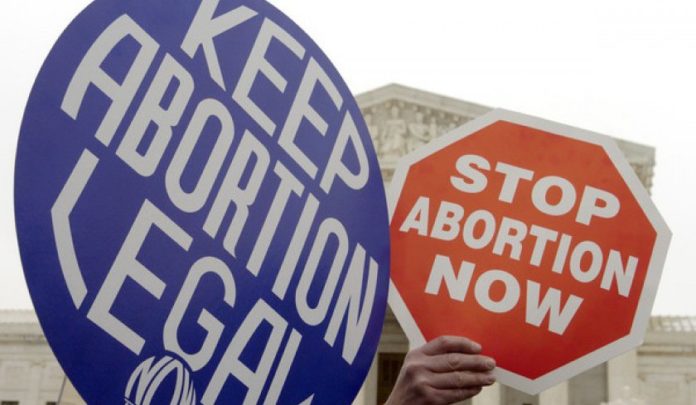
Abortion opponents are less likely to hear about the abortions women they know have had than are pro-choice Americans, a New York University study shows. The findings, which appear in the journal Sociological Science, point to a previously unexplored divide on the abortion issue: differences in perceptions of those we associate with.
“Americans who are opposed to abortion are less likely to hear that their sister, mother, or friend had an abortion than their pro-choice peers,” says Dr. Sarah K. Cowan, an assistant professor in NYU’s Department of Sociology and the study’s author. “Abortions are often kept secret both by women who have had them and by their confidants. Moreover, abortions are especially likely to be kept secret from those who are pro-life. These disclosure differences affect who hears about others’ abortions and may help explain the relative stability of Americans’ opinions on abortion.”
The research relied on a nationally representative survey of more than 1600 American adults who reported on their knowledge of others’ and their own experiences (or their partner’s experiences) of abortion and miscarriage. The results, which controlled for several variables, revealed that Americans who hold restrictive views on abortion are much less likely to hear of others’ abortions than are Americans who hold liberal views on abortion.
Compared to the people who think abortion should be widely accessible, the Americans who oppose abortion under all circumstances are 21 percent less likely to have heard about a personal connection who ended a pregnancy. And the Americans who think abortion should only be allowed in extreme cases — if the pregnancy resulted from rape or incest, for example — are 12 percent less likely to have heard about someone else’s abortion.
The study design, Dr. Cowan notes, reduces the likelihood that the results merely reflect association differences among groups — that is, abortion opponents may be less likely to say they know someone who has had an abortion because they tend to associate with those who are less likely to undergo this procedure, but the study accounted for this.
The research does so by controlling for a range of characteristics that could reveal such associative differences — these include race, age, religion, political party affiliation, and religious service attendance among others. Even after taking these into account, there exists a substantial difference in the likelihood of hearing an abortion secret by one’s attitude toward abortion.
Abortion stigma
These findings vary notably from those pertaining to miscarriages. Overall, according to the survey, 77 percent of women and their partners who experienced a miscarriage go on to tell someone else; for each miscarriage they tell, on average, 2.63 people. However, only 66 percent go on to share their abortion secrets to an average of 1.24 people. Similarly, when people are sharing news about another’s pregnancy loss, they more often talk and to more people about a miscarriage than an abortion.
National abortion and miscarriage rates indicate abortion is the more common event. That is, one in three American women will have an abortion in her lifetime and more recognized pregnancies end in abortion than in miscarriage, according to the Centers for Disease Control and the Guttmacher Institute. In contrast to this, Dr. Cowan’s research shows, however, that more Americans have heard of another’s miscarriage than an abortion — 79 percent have heard of a miscarriage and 52 percent of an abortion. This discrepancy arises from differences in disclosure.
“A third of women who have had an abortion have kept it a secret from someone with whom they usually talk about personal matters,” explains Dr. Cowan, who is also a Robert Wood Johnson Foundation Health and Society Scholar at Columbia University. “In addition, one quarter of confidants also keep the secret. Abortions are predominantly kept secret from immediate family members. People keep abortions — their own and others’ — a secret for reasons of privacy and to protect the woman who had the abortion from stigma.”
This reaction to stigma results in abortions being kept secret particularly from people who are opposed to abortion, she observes.
“American women of all backgrounds have abortions, but pro-choice Americans are more likely to hear of them than their peers who are opposed to  legalized abortion,” Dr. Cowan notes. “These differences in what Americans hear can affect public opinion, potentially helping explain the relative stability in public opinion on abortion over the past 30 years.”
legalized abortion,” Dr. Cowan notes. “These differences in what Americans hear can affect public opinion, potentially helping explain the relative stability in public opinion on abortion over the past 30 years.”
Indeed, abortion stigma leads to a range of harmful societal consequences including myths and stereotypes in the media, marginalization of abortion care, negative attitudes about abortion and providers, and shame and isolation among those who have terminated a pregnancy. Given the widespread and embedded stigma that surrounds abortion, it should not be surprising that its effects extend into the legislative arena, as well.
Abortion is the only FDA approved medical procedure that has ever been outright banned from Medicaid (thanks to the 1976 Hyde Amendment). What’s more, Medicaid covers other reproductive health care services, including birth control, sterilization, and prenatal and maternity care. And there are no other health issues for which so much time, money, and effort has been spent trying to regulate, restrict, and ultimately shut down on the basis of religious or ideological reasoning.
